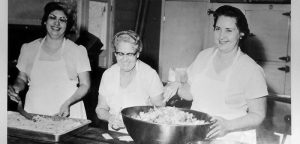Dr. Thaddeus Charles McCormick (1919 to 2012, of Buda) was the only pediatrician in most of the Buda-Kyle area between 1946 and 1959, delivering over 1,600 babies. The Hays Free Press is re-publishing this story, which originally ran Feb. 1, 2006.
by Jen Biundo
BUDA — You can’t help thinking that someone should make a movie out of Doc McCormick’s life, a story replete with all the comedy, tragedy and drama that comprised the life of the country doctor in the middle of the last century.
And don’t forget the babies, all 1,600 to 1,800 of ‘em.
This week, sitting in his Buda home with his wife Jerry, Doc McCormick flipped through a thick stack of
birth certificate first drafts from 1956, smiling with recollection. McCormick pointed to the card on the top of the stack – Luanne Brewington, the last baby born in that year.
“She’s named Luanne Caraway now, and she’s our county tax assessor,” McCormick said. “Her little brother was a 3.5 pound premie. We had an incubator that he stayed in for two or three months.”
McCormick has a near-encyclopedic memory of every family in the area, and all the children that made up his Buda legacy. From 1946 to 1959, McCormick delivered nearly every baby born in the Buda-Kyle area, birthing a slew of new Tenorios, Montagues, Garzas and Alcalas.
Dr. Thaddeus Charles McCormick, affectionately known as T.C. or plain Doc, came to Buda with his wife Jerry and two young children in 1946 and prepared to take over the Main Street medical practice of the retiring doctor, Clay Lauderdale.
At that time, Buda was a small farming community with a population of about 450, where ranchers and dairymen would gather at sunrise at Molly’s Caf√© to talk shop about their grain and cotton farming, milk delivery and livestock.
McCormick and the other returning servicemen who rolled into Buda after World War II represented an infusion of fresh blood and new ways of thinking into the community, shaking up the status quo.
When McCormick took over, there were two waiting rooms — one for the white patients and another for the black patients. With little fanfare, McCormick integrated his hospital and refitted the segregated waiting room into a laboratory.
“I had the personal pleasure of meeting a number of black people, some of whom said, ‘You’re the doctor from Buda who integrated the hospital,’” he said.
The new doctor was a handsome young man with a thick shock of wavy dark hair and a head full of new-fangled ideas, fresh out the army and just 27 years old. Too young, some townspeople thought, to capably serve as the only physician between Austin and San Marcos, handling obstetrics, geriatrics and everything in between. The nay-sayers were quickly proved wrong.
Old Dr. Lauderdale had only overseen home deliveries. Within six months, the new doctor had created a “lying-in” room with delivery tables in the hospital.
“I would have patients come in and we would take care of them there in a much more…” McCormick paused and smiled slightly, “…medically acceptable manner. A number of ladies in Buda with nursing experience would then come in and stay with the new mother and baby, overnight if necessary, with most going home within 24 hours after delivery.”
The full service, from pre-natal to post-natal care, cost about $150. Before long, McCormick was delivering between 125 and 150 babies a year. In between the deliveries, McCormick saw 60 to 70 patients a day, and did house calls in the undeveloped swath of ranchland and farmland surrounding the town at a travel fee of $1 per mile.
In the late 1940s, McCormick purchased an army hospital officers’ ward, which he transported through Elgin and Austin, and placed on a lot at the corner of Ash and San Marcos streets, under the name of Buda Hospital.
McCormick saw his first patients in the new clinic in early 1948 – two women from Manchaca who gave birth within 24 hours of each other. But the old hospital building he inherited wasn’t hooked up to a water supply.
“Mr. B. Watson, who owned the feed mill here, brought over two or three or more milk cans filled with water,” McCormick said. “You have to have hot water to deliver a baby.”
The most serious injuries were transported to an Austin hospital, but McCormick had plenty of other ailments to keep him occupied.
Early in McCormick’s tenure, a U.S. serviceman, his wife and their 2-year-old child had been living in Japan and just completed the long journey home to Buda. During the trip, the child came down with a nasty case of sinusitis and accompanying high fever, but in an odd twist, only one nostril was infected. He was given penicillin, which cleared up the fever, but he was sick again within the week. Doc McCormick peered up the infected nostril, pulled out his forceps and got hold of the offending intruder.
“It was the eraser off a #2 pencil,” Mc-Cormick recalled. “Poor little kid had it all the way from Japan to Buda.”
In a similar case, a middle-aged man came into the hospital, complaining of discomfort in his ears.
“He tells me he’s been deaf in that ear for years,” McCormick said. “I got out my instruments and pulled out a snail shell. He said ‘I put that in my ear when I was a little boy and was afraid to tell my momma.’”
Then there were the mid-century disease outbreaks that hit Buda: the polio epidemic of 1953-54 that killed a young soldier home on leave in Kyle, the endemic typhus that hit workers at the feed mill, and the relapsing fever, a tick-born spirochete disease similar to lime disease and to syphilis, that McCormick successfully treated with the old syphilis cocktail of arsenic and mercury.
“Things were changing very much in the practice of medicine over those years,” McCormick said.
When McCormick went to the University of Texas in the 1940s, pre-med students studied either French or German. But many of McCormick’s patients were Hispanic – either Buda-area locals or poor migrant workers who quietly passed through the area – and the new doctor gave himself a crash course in the Spanish language.
“I had one Hispanic patient who pointed at her stomach and said, ‘No tengo hambre,’” McCormick said. “I
thought she was saying, ‘No tengo hombre.’ We had to pull a woman out of the waiting room to translate.”
Many of the migrant workers came in to deliver their babies, often without the benefit of pre-natal care. In the early 1950s, McCormick delivered a healthy baby boy to one such migrant couple – who promptly stole away in the middle of the night, leaving their baby in the hands of someone they hoped could care for him.
Within a couple of years, “Little Joe” was a fixture in the hospital, riding his tricycle through the back
halls.
“We just kept taking care of him,” McCormick said. “A lot of people wanted to adopt him.”
But to everyone’s sadness, the couple returned to reclaim their abandoned child.
In 1959, McCormick ran into an old psychology professor, who convinced McCormick to move back to his original field of neuropsychology. After a three-year stint in Galveston, McCormick moved his family back to Buda and set up a clinic in Austin.
He has since retired, but found time along the way to serve as mayor of Buda and as a trustee on the Buda School Board, where he helped with the desegregation push. In 1975, the former country doctor was elected Distinguished Life Fellow of the American Psychiatric Association.






